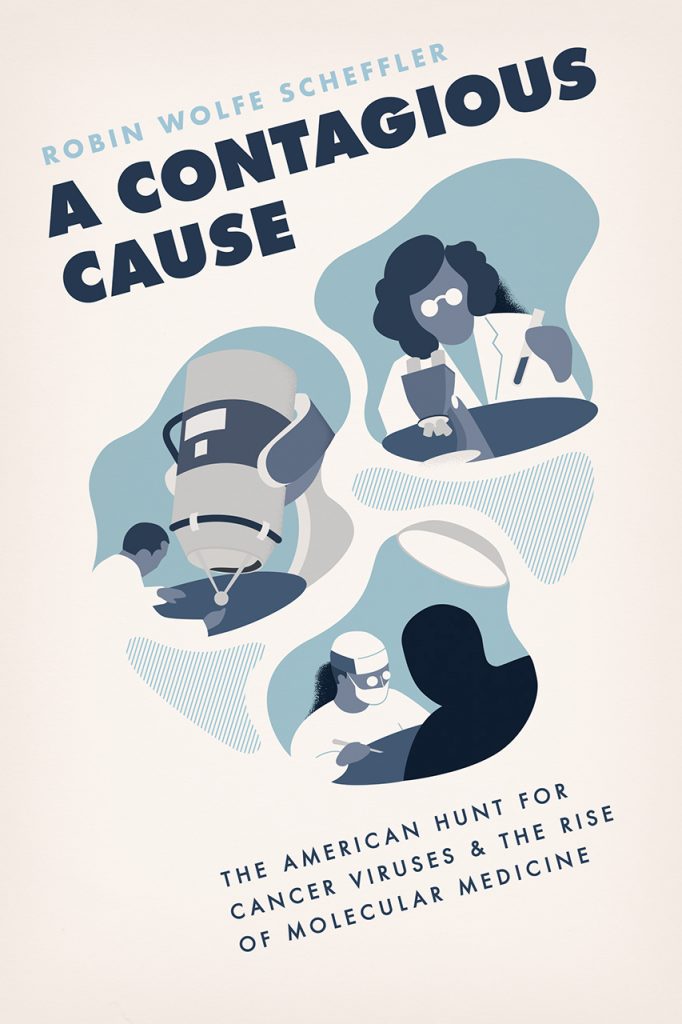5 Questions for Robin Wolfe Scheffler, author of “A Contagious Cause: The American Hunt for Cancer Viruses and the Rise of Molecular Medicine”
In his new book, A Contagious Cause: The American Hunt for Cancer Viruses and the Rise of Molecular Medicine, Robin Wolfe Scheffler explores the United States’s century-long search for a human cancer virus and reveals the ways in which the effort, while ultimately fruitless, profoundly shaped our understanding of life at its most fundamental levels.
We sent Scheffler a few questions to learn more about his research, his motivations for writing the book, his recent reads, and more.

How did you wind up in this academic field, and what do you love about it?
A British scientist named CP Snow once claimed that the sciences and humanities were two separate cultures, but I’ve never felt that way. I studied history and chemistry as a student at the University of Chicago. I was drawn to these two subjects because they each connected things—chemistry bridged biology and physics, history bridged the humanities and the social sciences. I explored everything from the economic geography of grain elevators to the mathematical modeling of dimerization before a professor suggested to me that studying the history of science might allow me to connect all of my interests. He was right!
Years later I still enjoy working in the history of science and medicine because of the different areas of knowledge I encounter every day. In a given day I can easily move from scientific papers to political theory and to literature— and back again. It’s an exhilarating experience and one that I love sharing with others.
In A Contagious Cause, you trace the history of the human cancer virus in twentieth-century America, documenting its origins and impact on the modern biological sciences. What drew you to this specific topic?
In the last fifty years our knowledge of the molecular basis of life has exploded. As one famous molecular biologist remarked, what was true of E. Coli bacteria was also true of elephants. When I started studying the history of modern biology I wanted to find a way of following this dramatic set of developments. As others have followed salt or cod, I was excited at the idea of telling this story by following cancer viruses, which formed the basis of many important advances in fundamental molecular biology.
However, as I followed these viruses, I found more and more questions rather than answers. When did the idea that “germs” existed in human cancer emerge, and who believed it? How was it possible for the American government to launch campaign larger than the Human Genome Project in pursuit of a vaccine for a human cancer virus whose existence was not proven? Why were so many leading molecular biologists dismissive of the idea of curing cancer despite receiving so much support from the National Cancer Institute?
Ultimately, I found following cancer viruses to be so rewarding because of the way that in raising these questions they allowed me to study important parts of the complex tapestry that binds the growth of modern science to American politics.
While you were working on this project, what did you learn that surprised you the most?
Before I started work on this project, I had not thought of cancer as a viral disease, so I was very surprised to learn that today experts estimate that as many as one in six cancers around the world have links to viral infection— particularly the hepatitis B and Human Papilloma Virus. While cancer doesn’t spread like an epidemic, this does mean that we could prevent a substantial number of deaths via vaccination. What I found truly surprising was how drastically this varies around the world— in sub-Saharan Africa, where cases of cancer are forecast to rise dramatically in the next generation, the proportion of cancers linked to viral infection may be as hight as four in ten. For me this highlights the importance of understanding that cancer can present a very different kind of public health problem depending on where we look.
Where will your research take you next?
My next project emerged from a moment of frustration when I was completing A Contagious Cause— a chapter I drafted on connections between the War on Cancer of the 1970s and the development of the biotechnology industry kept growing longer and longer as I found new material. I eventually realized that this frustrating final chapter was actually the beginning of an exciting new book! This second book, Genetown, will chronicle the history of the biotechnology supercluster in the Greater Boston Area as a case for thinking about the broader relationship between biotechnology and society.
What’s the best book you’ve read lately?
When I’m not researching and writing I try to read fiction, although I don’t always succeed. I found Hanya Yanagihara’s The People in the Trees really thought-provoking, along with Colin Whitehead’s Underground Railroad. Like many American historians I’m also eagerly awaiting the remaining volumes of Robert Caro’s LBJ biography!
Meet the author at the Seminary Co-op on Friday, May 17, from 6–7pm. He will be joined in conversation by James T. Sparrow and a Q&A and book signing will follow.
A Contagious Cause: The American Hunt for Cancer Viruses and the Rise of Molecular Medicine is available now! To learn more or buy a copy, visit the book’s page on our website or visit your local bookstore. You can also follow the author on Twitter for more info about his work.